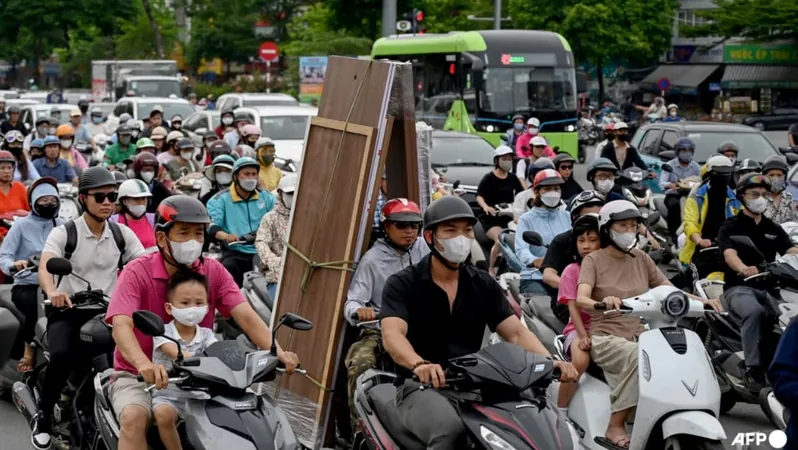
Hanoi's Controversial Ban on Petrol Bikes: A Green Transition or a Costly Burden?
2025-07-20
Author: Wei
HANOI: As Vietnam ramps up efforts to combat pollution, authorities have proposed a bold move to ban petrol-powered motorbikes from the bustling streets of central Hanoi. While this initiative aims to cleanse the smog-laden air, many riders are concerned about the hefty financial burden they’ll have to shoulder.
Housewife Dang Thuy Hanh expressed her frustration over a looming expense of 80 million dong (around $3,000) to replace her family’s scooters with electric bikes. "Certainly, everyone desires a cleaner environment," Hanh stated, but she questioned, "Why impose this transition on us without adequate preparation?" This sentiment resonates among the residents of Hanoi, where the scooter culture is deeply entrenched in daily life.
With nearly seven million two-wheelers navigating the roads, Hanoi’s traffic is notorious for its congestion. The city, home to nine million people, regularly finds itself topping global pollution charts, with emissions from its scooters contributing significantly to the health crisis linked to air quality.
The government's recent announcement to restrict fossil-fuel bikes in the city center starting July aims for a gradual roll-out over the next five years, which will ultimately include a complete ban on gas-fueled vehicles. However, many residents, including Hanh, fear the financial implications of such a mandate, especially when public charging infrastructure remains insufficient.
"Why force a change when the necessary facilities aren’t in place?" Hanh lamented.
In a country where multiple motorcycles are common for commuting and leisure, the call for greener transport often ignites concern that lower-income families bear the brunt of these initiatives. Similar situations have played out globally; for instance, London's recently implemented green tolls and France’s Yellow Vest protests highlight the struggles faced by working-class citizens under environmental regulations.
To ease the transition, Hanoi officials are considering subsidies of at least three million dong for e-bike switches and improving public transport options. However, for individuals like food delivery driver Tran Van Tan—who relies on his bike for a 40km commute—making this switch appears daunting. "The cost of changing to an e-bike is simply too high," shared the 45-year-old Grab app rider.
Concerns about battery life further complicate matters for long-distance riders. Despite these challenges, Deputy Mayor Duong Duc Tuan insists that urgent action is necessary to combat air pollution, which significantly contributes to public health crises.
Reports from Hanoi's Ministry of Environment indicate that over half of the toxic smog enveloping the city is attributable to petrol and diesel vehicles, while the World Bank suggests this number could be around 30%. As cities worldwide, including Barcelona, Paris, and Amsterdam, limit internal combustion engines, other Vietnamese cities like Ho Chi Minh City are also discussed transitioning to electric alternatives.
However, skepticism remains. Office worker Nguyen My Hoa doubts the feasibility of enforcing the ban on gasoline bikes. "Authorities will struggle to control the influx of petrol bikes into central areas. It simply won’t work," she noted.




 Brasil (PT)
Brasil (PT)
 Canada (EN)
Canada (EN)
 Chile (ES)
Chile (ES)
 Česko (CS)
Česko (CS)
 대한민국 (KO)
대한민국 (KO)
 España (ES)
España (ES)
 France (FR)
France (FR)
 Hong Kong (EN)
Hong Kong (EN)
 Italia (IT)
Italia (IT)
 日本 (JA)
日本 (JA)
 Magyarország (HU)
Magyarország (HU)
 Norge (NO)
Norge (NO)
 Polska (PL)
Polska (PL)
 Schweiz (DE)
Schweiz (DE)
 Singapore (EN)
Singapore (EN)
 Sverige (SV)
Sverige (SV)
 Suomi (FI)
Suomi (FI)
 Türkiye (TR)
Türkiye (TR)
 الإمارات العربية المتحدة (AR)
الإمارات العربية المتحدة (AR)